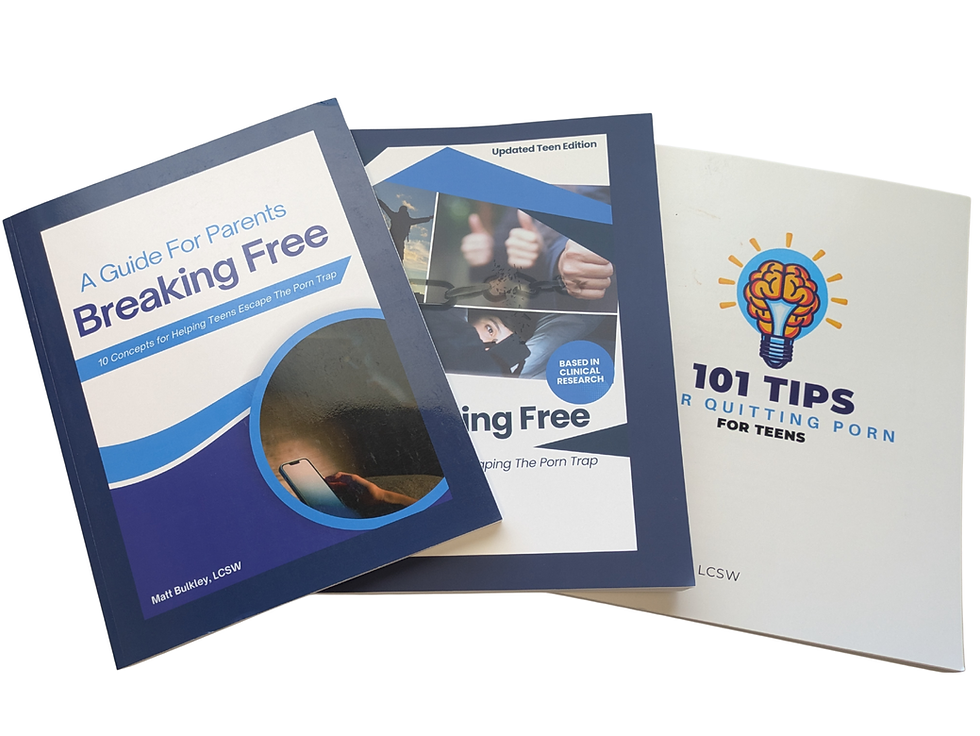Helping Your Child Quit Pornography: The Power of a Clear "Why"
- Matt Bulkley

- Jun 12
- 3 min read
Updated: Jun 18
As a parent, supporting your child in their journey to quit viewing pornography can feel overwhelming, but there’s a simple, science-backed step that can make a big difference: helping them identify why they want to quit and encouraging them to write it down. Here’s how this small action can set your child up for success and how you can guide them through it.
Why a Clear "Why" Matters
Having a personal reason to quit is like giving your child a North Star to guide them through tough moments. Whether it’s to feel better about themselves, strengthen their relationships, or prove they’re stronger than the habit, a meaningful reason keeps them motivated. Research shows that people who tie their goals to personal values are more likely to stick with behavior changes. Encourage your child to think about what quitting means to them—not just what others expect. Maybe it’s about regaining control, rebuilding trust with family, or feeling free from guilt. Whatever it is, it should resonate deeply.
The Magic of Writing It Down
Writing down their "why" isn’t just a feel-good exercise—it’s a game-changer. Studies suggest that people who write down their goals are 42% more likely to achieve them. When your child puts pen to paper (or types it out), it’s like signing a contract with themselves. It makes the goal feel real and official. Plus, the act of writing engages their brain in a way that helps cement their commitment, making it easier to stay focused when cravings hit.
How It Fits Into Recovery
Professionals who work with addiction recovery often start with this step. In many programs, teens are asked to create a "quit plan" that includes their reasons for stopping. This isn’t just busywork—data shows that young people who clarify their motivations early on are more likely to stay on track. You can help your child by talking through their reasons and encouraging them to make a list. Keep it simple: maybe it’s a note on their phone or a piece of paper in their wallet they can revisit when things get tough.
Why the Brain Loves It
Neuroscience backs this up—writing activates parts of the brain tied to focus and memory, like the reticular activating system. This helps your child’s goal stick in their mind, acting like a mental shield against temptation. When they’re stressed or tempted, glancing at their written "why" can snap them back to their bigger purpose. It’s a small habit with a big impact.
A Tool for Real Recovery
In therapy settings, like cognitive behavioral therapy (CBT), teens are often encouraged to articulate and write down their reasons for change. This practice is especially effective for overcoming addictive behaviors because it shifts focus from short-term impulses to long-term goals. For your child, this could mean writing something like, “I want to quit because I want to feel proud of myself again.” That kind of clarity can be a lifeline during moments of weakness.
How You Can Help
Here’s how you can support your child in this step:
Start a Conversation: Ask open-ended questions like, “What would quitting mean for you?” or “What’s one thing you’d love to feel instead of the stress this habit brings?” Avoid judgment—let them share what matters to them.
Encourage Writing: Suggest they write their reasons in a place they can easily revisit, like a journal, a phone note, or even a sticky note on their desk. It doesn’t have to be long—just heartfelt.
Be Their Cheerleader: Celebrate their effort to define their "why." Let them know you’re proud of their courage to take this step.
Model It Yourself: Share an example of a goal you’ve written down and how it helped you stay focused. This can make the process feel less daunting and more relatable.
Why It’s a Game-Changer for Pornography Addiction
Pornography addiction can trap your child in a cycle of seeking quick highs, often at the expense of their self-esteem and relationships. Writing down their reasons to quit helps them focus on the bigger picture—whether it’s rebuilding trust, feeling in control, or pursuing their dreams. It’s a simple tool that acts like a shield against impulsive urges, giving them something tangible to hold onto when cravings strike.
By helping your child clarify their "why" and put it in writing, you’re giving them a powerful first step toward freedom from pornography. It’s not just about stopping a habit—it’s about empowering them to take charge of their life. Encourage them to start small, stay honest, and keep their "why" close. You’re not just their parent in this moment—you’re their partner in helping them build a stronger, healthier future.










Comments